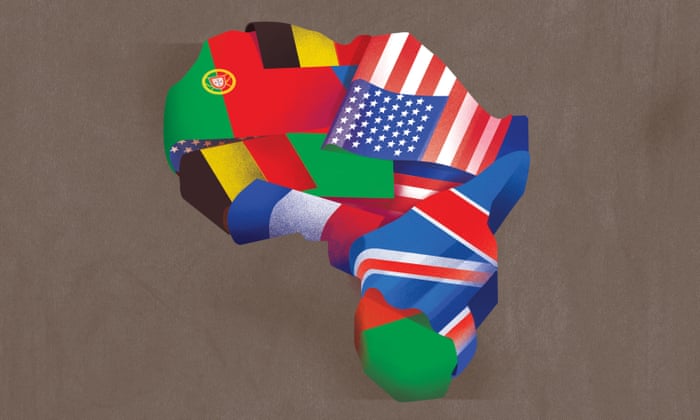Don’t panic! Don’t panic! You need not spoil your Christmas by worrying that Britain is walking the Brexit tightrope without a safety net because the defence secretary, Gavin Williamson, has announced that the armed forces are on standby.
Standing by to do what exactly? That is not clear. Penny Mordaunt, the international development secretary, is redeploying civil servants with expertise in disaster management to no-deal emergency planning. And Matt Hancock, the health secretary, has declared himself the world’s biggest purchaser of fridges so that the NHS has somewhere to keep stockpiles of critical medicines. He recently told colleagues that, in the event of a bad Brexit, he could not guarantee that people would not lose their lives. Choose Brexit – and you may die. They certainly didn’t put that on the side of their campaign bus.
Those who willed this nightmare on our country did not reveal that it would require such costly and alarming measures
The obvious thing to say, but worth emphasising nevertheless, is that those who willed this Brexit nightmare on our country did not reveal that it would require such costly and alarming measures. They sold it as liberation day, not doomsday. Do you recall Boris Johnson and his gang telling us that leaving the EU could mean putting troops on the street, establishing a “war room” in the NHS, emergency airlifts of medicines, leafleting every household with advice on how to cope with food shortages and deploying those with experience of dealing with the aftermath of tornadoes, epidemics and tsunamis? No, me neither. It was supposed to be a piece of cherry-topped cake, not a humiliating national calamity.
A few of the Brexiters are still trying to claim that it might somehow turn out all right on the night, so it is important to be clear about the consequences of a no-deal outcome. It will mean a stark rupture to our relationship not just with the EU but with much of the rest of the world. The overnight termination of almost every legal and trading agreement between Europe and Britain would cause disruption without precedent in peacetime. There will be no transition arrangements. There will be no mutually recognised rights for EU citizens living in the UK and Brits living in the rest of the EU. There will be a hard border in Ireland. Instead of a glide path into a new relationship with our continent, Britain will be in free fall.
Large businesses have taken some precautions against a botched Brexit. That was only sensible after the abject combination of tragedy and farce that has played out over the past 30 months. But hardly anyone is ready for the crash version. Neither is the government. It can’t even tell companies what tariffs they might be expected to pay on imports from the EU. Britain’s five most important business organisations – the CBI, the Institute of Directors, the British Chambers of Commerce, the Federation of Small Businesses and the manufacturers’ body, EEF – all agree. An unprepared Britain would be plunged into severe turbulence.
There is no such thing as a pain-free no deal
Earlier this year, the British Chambers of Commerce outlined 24 critical risk questions that businesses needed answering in order to cope with any Brexit scenario. The BCC reports today that, with under 100 days left, the government has produced a satisfactory response to just two of the 24, while 15 “are still flashing red”.
A few of the Brexiters in the cabinet are touting the idea of a “managed no deal”. This is oxymoronic. There is no such thing as a pain-free no deal. It is notable that this latest iteration of fantasy Brexit is most often promulgated by ministers, such as Andrea Leadsom, who have no responsibility for delivering essential services. Even these Brexiters don’t deny that a no-deal outcome would present a big challenge to government on multiple fronts. In the light of their recent performance, how confident are you that our masters of disaster could cope? A couple of drones have just incapacitated Gatwick airport, an example of the degree to which the complex systems of advanced societies can be acutely vulnerable to disruption.
In a no-deal Brexit, a key role will be played by Chris Grayling, the rogue drone who goes by the title of transport secretary. This is the one-man disrupter who proved incapable of introducing new rail timetables without throwing the network into chaos. I don’t know about you, but I am not sleeping better at night for knowing that Failing Grayling will be in charge of trying to manage ports gridlocked by a crash-out Brexit.
I can’t forecast exactly would happen. No one can. One of the alarming things about this scenario is its very unpredictability. I observe that civil servants, those who lead government agencies and the majority of the cabinet, the people who would be expected to handle the consequences, are very scared of no deal. They differ only in thinking that it will be absolutely catastrophic or merely disastrous. Ministers fear that the disruption to normal life will be deeply serious and there will be an extremely nasty hit to the economy, a combination that would inflict once-in-a-generation damage on the Tory party’s reputation.
A calamity Brexit would do to the Conservatives what the Winter of Discontent did to Labour. The mass strikes that overwhelmed the Callaghan government in 1978-79 seared into the national collective consciousness images of picket lines, paralysed services, rubbish piling up in the streets, the sick going untreated and the dead left unburied. That haunted Labour, and cost it public trust, for years after the event. Empty supermarket shelves, shortages of critical medicines, stranded travellers, motorways to ports turned into giant lorry parks and all the other consequences of a bad Brexit would not be quickly forgotten nor forgiven. This spectre chills the blood of some of the most hardcore Brexiters in the cabinet. The case of Michael Gove is instructive. Ardent Brexiter that he is, his departmental responsibilities for farmers and the food supply have opened his eyes to how bad no deal could be for both the country and his party. In a piquant twist, he is now one of those ministers who believe that any deal is better than no deal.
This is a highly perilous game of chicken in which people’s livelihoods, and quite possibly people’s lives, are at stake
David Gauke, the justice secretary, is not a man given to the hyperbolic statement. His usual role in government is to be deployed as a fire blanket for the smothering of any controversy that is getting fiery. So it is noteworthy when such an unflamboyant figure publicly declares that a no-deal Brexit would be so grotesquely irresponsible that he would quit the government rather than sit in a cabinet that allowed it to happen.
If all the sentient members of the cabinet think a no-deal Brexit will be a calamity, and as good as admit this in public, why is the government nevertheless acting as if it might allow that to come to pass? Bluff, blackmail and brinkwomanship feature in the explanation. Though Theresa May will say that this is not a scenario she wants or expects to happen, some of her strategists think that amping up the prospect of a disaster Brexit suits her. The prime minister is still hoping that she can extract some last-gasp concessions from the EU that will help her get her unloved deal through parliament. European leaders are sounding unwilling to do very much to assist her. The EU has worked on the assumption that Britain is not so crazy as to crash out in a way that would hurt it, but us much more. So part of Number 10’s calculation is that the EU needs to start worrying that it really is possible that this could transpire.
To make sense of this, it is useful to have some familiarity with “madman theory”. This was an idea about how to conduct international relations that was formulated during the Cold War, when Richard Nixon was in the White House. It was thought to be useful for America to have a leader who seemed to be a bit unhinged, because this would throw the other side off balance and force the Soviet Union to make concessions for fear that the US president might be crazy enough to start a nuclear war. The Brexit variant is to induce the EU to believe that Britain might be unbalanced enough to crash out. The EU will then, so goes the theory, give Mrs May what she needs. She is also gambling that fear of a disaster Brexit will drive many Conservative MPs who don’t like her agreement into supporting it.
This is a highly perilous game of chicken in which many people’s livelihoods, and quite possibly people’s lives, are at stake. The risk is that it could accidentally lead to the very catastrophe that it is supposed to prevent. It was called “madman theory” for a reason.
A merry Christmas, everyone. I will not tempt fate by wishing you a peaceful and prosperous new year.

